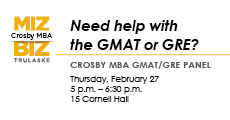Chancellor R. Bowen Loftin met with Faculty Council members publicly for the first time Feb. 13. He answered questions on Renew Mizzou and shared governance, and offered a rough timetable for hiring the next provost.
Loftin arrived early to the Memorial Union meeting, smiling, shaking hands and chatting with faculty, staff and members of the press. Rather than standing at the head of the long table, occupied by about 20 faculty, Loftin stood midway.
“It is a great responsibility to be official representation of the faculty,” said Loftin, who while a physics professor at the University of Houston–Downtown in the 1980s was a Faculty Senate member for six years, including two years as president.
“I hope we can find ways to work with each other very well,” he said.
Loftin offered members advice about presenting him information. “Do your homework,” he said. “People jump to conclusions. But if you are armed with the right facts, I will listen to what you say.”
Loftin promised members that faculty would have input in the search for MU’s next provost. “I want to get a full description of what you want,” he said. He hopes that a pool of candidates will be identified during summer. Hiring won’t happen until the fall 2014 semester, Loftin said.
Further, searches for the positions of the School of Journalism dean (Dean Mills retires Aug. 31) and vice chancellor for research will be influenced by the provost selection, he said.
As for filling the dean position in the School of Medicine, Loftin said the search is narrowing. A key role for the new medical school dean will be increasing medical research. The school needs to “enhance its ability” in that area, Loftin said.
During questions, Harry Tyrer, a professor of electrical and computer engineering, brought up the issue of shared governance and Renew Mizzou, a building renovation project that is displacing about 1,000 faculty and staff. Some council members say faculty, especially those being moved, should have been involved in the moving plan. Tyrer said there is a tendency for MU middle management to leave faculty out of decisions.
Loftin said faculty should have been more involved. “I know it wasn’t handled as well as it should have been. I’ve learned the hard way that lack of communication causes a lot of problems.”
Also speaking publicly for the first time to Faculty Council was David Rosenbaum, who started as director of the University of Missouri Press Nov. 1.
Prior to joining the press, Rosenbaum managed the domestic and international publishing branches of the American Heart Association.
His résumé includes stints as senior acquisitions editor at Delmar Cengage Learning, a textbook publisher, and senior publisher and production manager at Iowa State Press.
Part of the application process for the press director position was creating a strategy plan. Rosenbaum finished his in August; the Press Advisory Committee, created by council members, finished its plan early in the fall 2013 semester. Though developed independently, the committee’s plan and Rosenbaum’s plan overlapped considerably.
The main areas were to refine and refocus the editorial program, expand book subjects into the sciences and professions, and make the press profitable through better marketing and more popular book titles.
Rosenbaum said one problem he is rectifying is the lack of marketing for the more than 400 backlisted history titles. He called the backlist “a carefully guarded secret.”
“We have been sitting on a gold mine, but we had no effective way to market it,” he said.
In July 2013, the Advisory Committee requested a financial forecast from the press but never received it, perplexing members. Rosenbaum explained why. “You were told correctly that the information doesn’t exist,” he said.
Despite the challenges, Rosenbaum predicted that the press will eventually be in the black. He said that when he left Iowa State Press, it was in the black by $400,000.
By contrast, in fiscal 2012, Missouri Press received a subsidy of $400,000 from the University of Missouri Press System to keep it operating.


